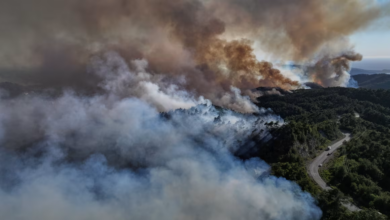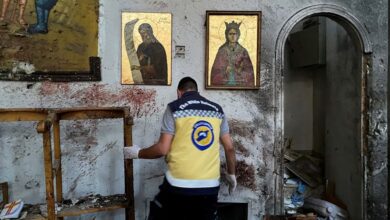On Friday, readers of The New York Times woke to sobering news of the death of one of the newspaper’s most celebrated journalists, Anthony Shadid.
The two-time Pulitzer Prize-winning Middle East correspondent had been surreptitiously reporting inside Syria, covering Bashar al-Assad’s brutal crackdown of the uprising there. Despite the risk of reporting under a ban on foreign reporters, Shadid was in Syria because he had made it his journalistic mission to cover the Arab revolutions for Western audiences. He was unrelenting in his belief that the world needed to understand these movements, and whether it was from Tunis, Benghazi or Tahrir, Shadid’s words helped define the narrative of the Arab Spring.
Tragically, he suffered a severe asthma attack on Thursday evening and died in the field. He was 43 years old. His colleague, the photojournalist Tyler Hicks, carried his body across the border from Syria to Turkey.
I acknowledge that for a region that has known so much suffering and loss, to mourn an individual ‘Western’ reporter’s life might seem aggrandizing. But the tributes that poured out from across the Arab world and from the US were testaments to the fact that Shadid transcended the role of an ordinary foreign correspondent. He was a rare Arab-American star of the journalism establishment: an award-winning reporter, a beautiful writer and, above all, a deeply respectful advocate for cultural understanding.
I first encountered Anthony Shadid not through his articles in the Washington Post or The New York Times, but as the author of a haunting book about the Iraq war, “Night Draws Near.” In stark contrast with the embedded military and Green Zone dispatches offered by most American journalists, Anthony Shadid set out to tell the story of ordinary Iraqis in the months leading up to and following the invasion. Nobody else was illuminating that side of the story and it fundamentally changed my understanding of the war. But what struck me even more was Anthony Shadid’s uniquely American voice, his dualism. His ability to speak Arabic and write English as if a poet, his historical and deeply personal view of Arabs and Americans — it was that double consciousness that gave his work its grace and its insight.
Unlike many reporters, he did not believe in ‘parachuting’ into the region during a crisis. He lived there, spoke the language fluently and understood the nuances of the societies he covered. He wrote about the joy, the music, the warmth of the Middle East; and he wrote about the bitter politics and the violent sectarianism. As a result of that duality, Anthony Shadid’s dispatches allowed us to understand the humanity of the Arab world alongside its tragedies. And perhaps his intimate understanding of that fragile balance was a reflection of his own story.
Anthony Shadid was born in Oklahoma to Lebanese-American parents. His family had left their ancestral village in southern Lebanon generations earlier in pursuit of the American ‘dream.’ Shadid studied political science and journalism at the University of Wisconsin, and he recognized early in his career that he wanted to cover the region his family had once called home. He moved to Cairo to learn Arabic, befriended scholars including Edward Said and wrote his debut book about the legacy of political Islam. His star rose quickly and he went on to cover stories from Palestine to Iraq for esteemed newspapers such as The Boston Globe and the Washington Post. In 2009, he was offered one of the most important jobs in American journalism, that of a Middle East correspondent for The New York Times. It was opportune timing because it would give him the support and the platform he needed to cover the Arab Spring in all its complexity and depth.
Shadid’s unique voice is best reflected in his final project, a memoir of his family’s history in Lebanon called “House of Stone,” which was scheduled to be published a few weeks after his untimely death. It is the story of his personal return to embattled southern Lebanon and his journey to renovate his great grandfather’s home so that it would become his family’s bayt, the home where he had planned to raise his children with his wife and the home he wished would become a symbol of his hopes for the future of the Middle East. I encourage you to seek out and read his work as a source of optimism against the cynicism we often feel about the role of media in the world today.
In Anthony Shadid’s death, the US and the Arab world have lost a rare, critical bridge of understanding. His writing is his enduring legacy and he leaves behind those articles and books as a gift to a new generation of journalists. For that, I am both deeply saddened and deeply grateful.
Bilal Qureshi is a Pakistani-American radio journalist based in Washington DC.



